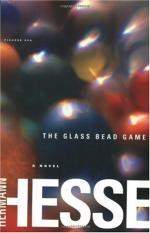|
This section contains 7,528 words (approx. 26 pages at 300 words per page) |

|
SOURCE: Krapp, John. “Herman Hesse's Hegelianism: The Progress of Conciousness Towards Freedom in The Glass Bead Game.” Studies in 20th Century Literature 26, no. 2 (summer 2002): 342-62.
In the following essay, Krapp discusses the influence of Hegaelian ideas in most of Hesse's works, specifically in The Glass Bead Game.
It is a commonplace in criticism of Hermann Hesse's fiction that the novels' major characters expend considerable intellectual, emotional, and spiritual energy to bring into balance a variety of ideological oppositions that otherwise cause the characters equally considerable anxiety. Hesse's tendency to incorporate a dynamic of ideological conflict and resolution into his novels is frequently explained as a natural product of his extensive knowledge of Eastern religion and philosophy, which he learned as the child of missionaries to India and continued to develop during the course of his life. This account of the way Hesse represents ideological conflict and resolution in...
|
This section contains 7,528 words (approx. 26 pages at 300 words per page) |

|


